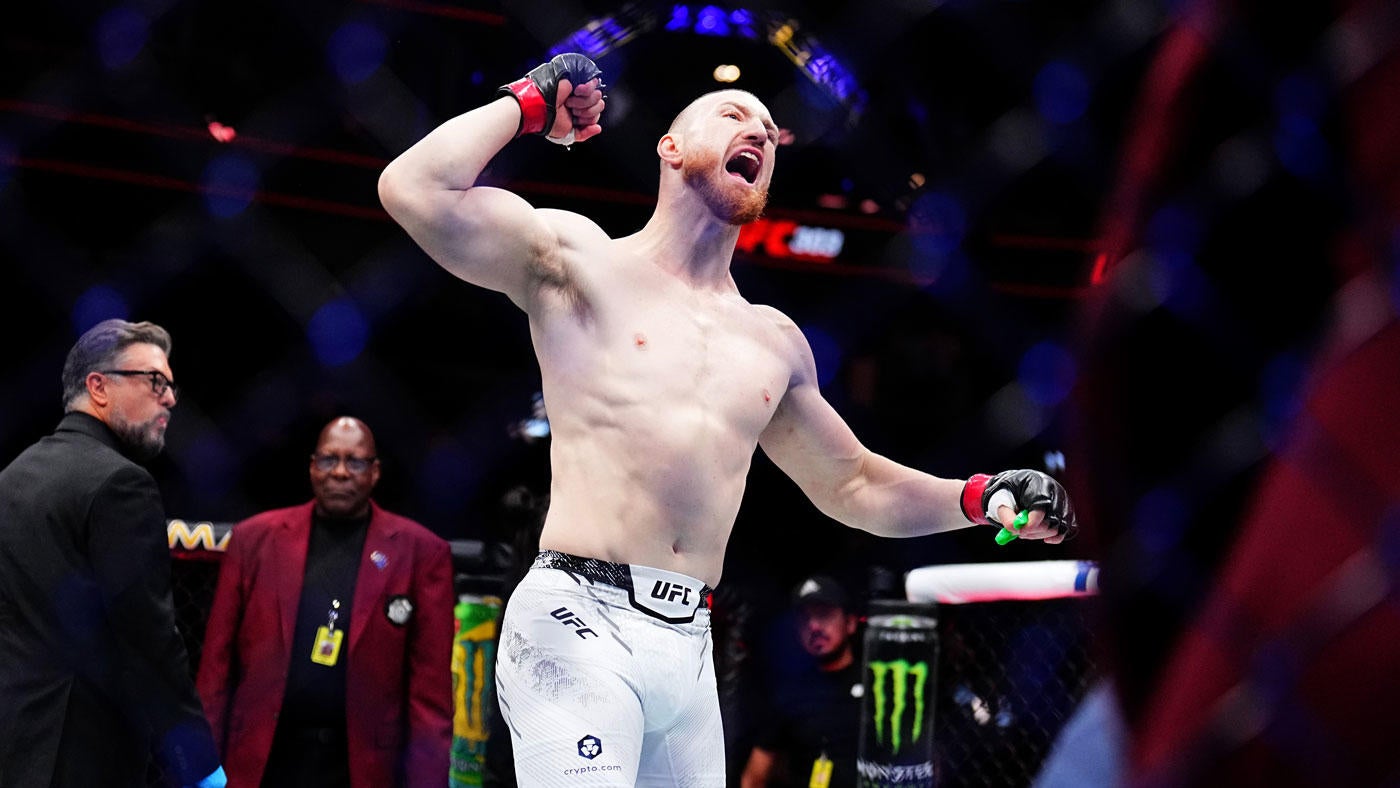Greatest win for all 32 NFL teams: Cowboys’ first Super Bowl victory remains franchise’s pinnacle moment
Written by CBS SPORTS ALL RIGHTS RESERVED on June 30, 2024


It’s been over 50 years, but time hasn’t diminished the shine of the Dallas Cowboys’ greatest moment. Like several other teams, the Cowboys’ first Super Bowl win remains the greatest victory in franchise history, even though Dallas has enjoyed many other memorable wins in the decades since.
The Cowboys’ victory on an unseasonably cold New Orleans afternoon in January 1972 is just one of the games included in our following list detailing each NFL’s team’s greatest win. We’ve also included each team’s runner-up greatest victory.
Arizona Cardinals
Greatest win: 1947 NFL Championship: Cardinals 28, Eagles 21
Runner-up: 2008 NFC Championship: Cardinals 32, Eagles 25
Ironically, the Cardinals’ two greatest victories came against the same opponent. In the ’47 title game, the Cardinals’ Elmer Angsman, who was born the year the Cardinals won their first title (in 1925), ran for 159 yards and two touchdowns to lead the Cardinals to their second title.
While their offense ran the ball at will, the Cardinals’ defense held Eagles Hall of Fame halfback Steve Van Buren to just 26 yards rushing on 18 carries. Van Buren would then lead Philadelphia to back-to-back championships, while the Cardinals continue to wait for their next NFL title.
Atlanta Falcons
Greatest win: 1998 NFC Championship: Falcons 30, Vikings 27 (OT)
Runner-up: 2016 NFC Championship: Falcons 44, Packers 21
In one of the most surprising upsets in NFL postseason history, Atlanta’s “Dirty Birds” overcame a 13-point deficit to stun the Vikings, who went 15-1 during the regular season.
Trailing 27-20, the Falcons caught a break when Vikings kicker Gary Anderson, who did not miss a field goal during the regular season, missed a 38-yard attempt with 2:07 left. Atlanta capitalized on Anderson’s miss, as Chris Chandler hit Terance Mathis for the game-tying touchdown with 57 seconds left in regulation. The teams exchanged punts in overtime before two Chandler completions to tight end O.J. Santiago and two runs by Jamal Anderson set up Morton Andersen’s game-winning, 38-yard kick.
Buffalo Bills
Greatest win: 1992 AFC wild card: Bills 41, Oilers 38 (OT)
Runner-up: 1964 AFL Championship: Bills 20, Chargers 7
Three of Buffalo’s four consecutive AFC title wins from 1990-93 included victories over Hall of Fame quarterbacks John Elway, Dan Marino and Joe Montana. But it was the Bills’ improbable wild-card comeback win over the Oilers that stands as the Bills’ greatest win.
Trailing 35-3 at the start of the second half, four touchdown passes from backup quarterback Frank Reich gave the Bills a fourth-quarter lead. After the Oilers forced overtime, an interception by Nate Odomes set up Steve Christie’s game-winning, 32-yard field goal. The win helped the Bills advance to their third of four consecutive Super Bowls.
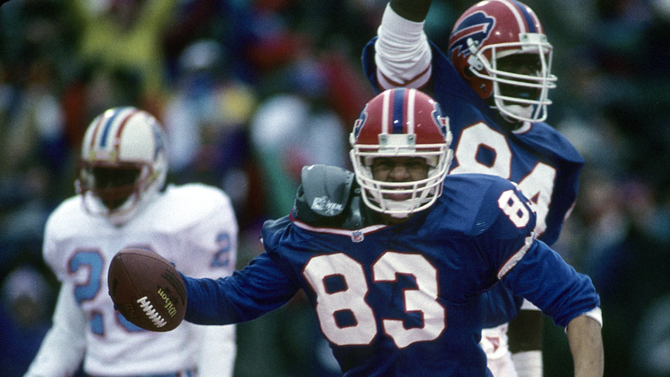

Baltimore Ravens
Greatest win: Super Bowl XXXV: Ravens 34, Giants 7
Runner-up: Super Bowl XLVII: Ravens 34, 49ers 31
Super Bowl XXXV was vindication for the 2000 Ravens’ defense, who solidified their place as an all-time great unit after holding the Giants to just 152 total yards. New York’s offense, two weeks after scoring 41 points against the Vikings, did not score a touchdown against the Ravens and game MVP Ray Lewis. Conversely, the Ravens scored touchdowns on offense, defense and special teams. Duane Starks’ 49-yard pick gave Baltimore a 17-0 lead. Jermaine Lewis’ kickoff return for a touchdown moments later sealed the win.
Carolina Panthers
Greatest win: 2015 NFC Championship: Panthers 49, Cardinals 15
Runner-up: 2003 NFC Championship: Panthers 14, Eagles 3
After a 15-1 regular season, the Panthers dethroned the defending NFC champion Seahawks in the divisional round, 31-24. In the NFC title game, the Panthers dominated a talented Cardinals team, led by league MVP Cam Newton’s four touchdowns and 382 all-purpose yards. Linebacker Luke Kuechly returned one of the Panthers’ four interceptions of Carson Palmer for a score, as the ’15 Panthers punched the franchise’s second ticket to the Super Bowl.
Cincinnati Bengals
Greatest win: 2021 AFC Championship: Bengals 27, Chiefs 24 (OT)
Runner-up: 1981 AFC Championship: Bengals 27, Chargers 7
Without a doubt, the Bengals’ coming back from 18 points down to stun the defending champs in their house is the best win in franchise history. Joe Burrow, who was masterful during the Bengals’ comeback, joined Tom Brady as the only two quarterbacks to defeat Patrick Mahomes in a playoff game.
Burrow had plenty of help from his defense, which sacked Mahomes four times and intercepted him twice. Safety Vonn Bell’s pick of Mahomes in overtime set up Evan McPherson’s game-winning field goal, sending the Bengals to their first Super Bowl in 33 years.
Cleveland Browns
Greatest win: 1964 NFL Championship: Browns 27, Colts 0
Runner-up: 1950 NFL Championship: Browns 30, Rams 28
The Browns ended their eight-year championship drought with a dominant win over Johnny Unitas and the Colts.
While Jim Brown was his usual dominant self (gaining 114 yards on 27 carries), the Browns’ offense received a monster effort from Gary Collins, who caught five passes for 130 yards and three touchdowns. Defensively, Cleveland picked off Unitas twice while holding him to under 100 yards passing. The championship was the first for then-rookie receiver Paul Warfield, who later won two Super Bowls as a member of the Dolphins.
Chicago Bears
Greatest win: Super Bowl XX: Bears 46, Patriots 10
Runner-up: 1940 NFL Championship: Bears 73, Washington 0
This was one easy; no game in Bears history (not even the biggest blowout in championship game history) compares to Chicago’s first — and last — Super Bowl win.
One of the most celebrated teams in NFL history, the ’85 Bears capped off their 18-1 season (including playoffs) with the largest margin of victory in Super Bowl history at that time. The Bears’ “46” defense, led by game MVP Richard Dent, suffocated the Patriots’ offense, forcing six turnovers and holding New England to 123 total yards. The Bears’ defense also scored twice while making an emphatic case as the greatest defense in NFL history. Walter Payton, who became the NFL’s career rushing champion one year earlier, was finally crowned as a world champion after an 11-year wait.
Dallas Cowboys
Greatest win: Super Bowl VI: Cowboys 24, Dolphins 3
Runner-up: 1992 NFC Championship: Cowboys 30, 49ers 20
While they’ve been known as “America’s Team” since 1979, the Cowboys were previously labeled as “next year’s champions” after coming up short in several championship games that included a three-point loss in Super Bowl V. The 1971 Cowboys finally broke through; they went 10-0 with Roger Staubach starting under center, capped off with a dominant Super Bowl win over Don Shula’s Dolphins.
Staubach won Super Bowl MVP honors, while his rushing attack — led by Duane Thomas and Walt Garrison — ran for over three times as many yards as the Dolphins’ backs Jim Kiick and Larry Csonka. Dallas’ “Doomsday” defense, led by linebacker Chuck Howley, defensive tackle Bob Lilly and defensive backs Mel Renfro, Herb Adderley and Cliff Harris, became the first unit to not allow a touchdown in the Super Bowl.
Denver Broncos
Greatest win: Super Bowl XXXII: Broncos 31, Packers 24
Runner-up: Super Bowl 50: Broncos 24, Panthers 10
Denver’s first Super Bowl win was historic. The Broncos’ dethroning of the Packers was at the time the second-greatest upset in Super Bowl history. It also ended the NFC’s 13-game winning streak over the AFC in Super Bowl competition.
John Elway, after three prior Super Bowl losses, was hoisted on his teammates’ shoulders after winning his first ring. The MVP award went to Terrell Davis, who rushed for 157 yards and three touchdowns on 30 carries despite missing most of the second quarter with a migraine headache. Denver’s defense forced two turnovers off of league MVP Brett Favre. They sealed the win on a fourth-down stop with 32 seconds left.
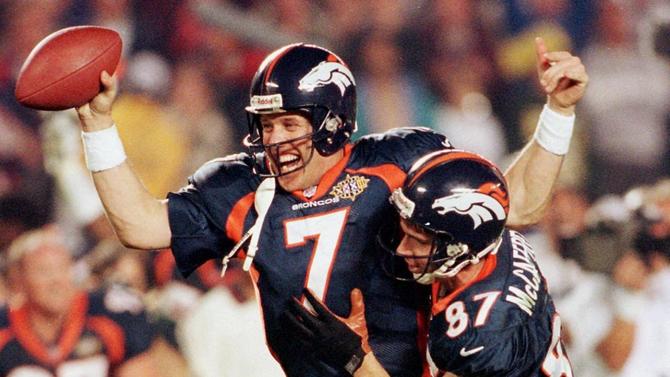

Detroit Lions
Greatest win: 1957 NFL Championship: Lions 59, Browns 14
Runner-up: 1991 NFC divisional round: Lions 38, Cowboys 6
The experienced Browns were no match for the Lions, who never took their foot off of the gas pedal in a 45-point win. Detroit received an epic performance from quarterback Tobin Rote, who threw for 280 yards and four touchdowns. Rote had two 100-yard receivers in Steve Junker and Jim Doran, who caught a combined eight passes for 210 yards and three touchdowns. Detroit’s cagey defense recorded five interceptions while holding Jim Brown to 69 yards rushing.
Green Bay Packers
Greatest win: 1967 NFL Championship: Packers 21, Cowboys 17
Runner-up: Super Bowl I: Packers 35, Chiefs 10
A partisan Packers crowd inside Lambeau Field braved the -23 windchill to see if their team could win a fifth NFL championship in a seven-year span while getting back to the Super Bowl. The Cowboys didn’t make it easy, however, taking a 17-14 lead in the fourth quarter on Lance Rentzel’s 50-yard touchdown pass from halfback Dan Reeves.
Undaunted, Barr Starr and the Packers drove into Cowboys’ territory before facing third and goal from the one-yard line with just seconds left. After using their final timeout, legendary Packers coach Vince Lombardi decided to risk having the clock run out on his team by calling a running play. Starr, who was supposed to give the ball to Chuck Mercein, decided to keep the ball while running behind Hall of Fame lineman Jerry Kramer. The score gave Green Bay a 21-17 victory en route to a 33-14 win over the Raiders in Super Bowl II. It would be the Packers’ final championship during their decade of dominance.
Houston Texans
Greatest win: 2019 wild card: Texans 22, Bills 19 (OT)
Runner-up: 2011 wild card: Texans 31, Bengals 10
The franchise’s first playoff win is trumped only by the Texans’ most recent postseason win. While the Texans’ defense was buoyed by J.J. Watt’s return from injury, Buffalo still managed to jump out to an early 16-0 lead. Houston responded with 19 unanswered points that included two touchdowns from Deshaun Watson. Undaunted, Bills quarterback Josh Allen drove Buffalo into field-goal range, as Stephen Hauschka forced overtime with a 47-yard field goal. The teams exchanged punts in overtime before Watson’s 34-yard completion to Taiwan Jones set up Ka’imi Fairbairn’s game-winning, 28-yard field goal.
Indianapolis Colts
Greatest win: 1958 NFL Championship: Colts 23, Giants 17 (OT)
Runner-up: 2006 AFC Championship: Colts 38, Patriots 34
The Colts made history by winning the NFL’s first-ever overtime game. After Giants halfback Frank Gifford started the fourth quarter with a go-ahead touchdown, Johnny Unitas’ slew of completions to Raymond Berry set up Steve Myhra’s game-tying field goal. In overtime, Alan Ameche’s one-yard score sealed the Colts’ first world championship.
Unitas threw for 349 yards, with Berry catching 12 passes for 178 yards and a touchdown. Hall of Fame halfback Lenny Moore contributed to the cause with 101 yards on six receptions.
The game, played in front of a sold-out crowd at Yankee Stadium, significantly contributed to the NFL’s growing popularity heading into the 1960s.
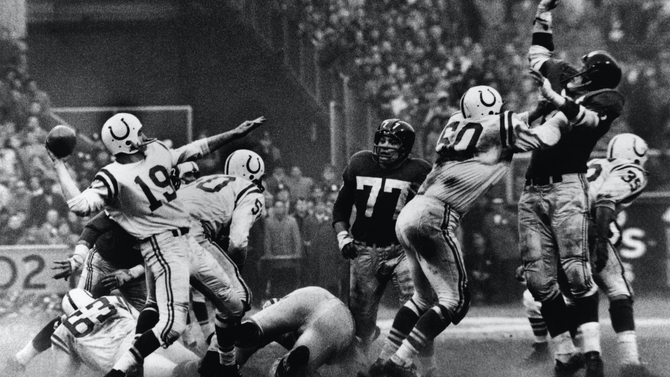

Kansas City Chiefs
Greatest win: Super Bowl LIV: Chiefs 31, 49ers 20
Runner up: Super Bowl IV: Chiefs 23, Vikings 7
The Chiefs’ win over the 49ers was historic on multiple levels. It was the Chiefs’ first Super Bowl win in 50 years, a win that punched Andy Reid’s future Hall of Fame ticket while also solidifying Patrick Mahomes‘ status as an NFL superstar. The win also marked the third consecutive playoff game where Kansas City overcame a double-digit deficit to win, an NFL record. Mahomes became the first player to win league and Super Bowl MVP honors before his 25th birthday.
Los Angeles Chargers
Greatest win: 1981 divisional round: Chargers 41, Dolphins 38 (OT)
Runner-up: 1963 AFL Championship: Chargers 51, Patriots 10
The ’81 Chargers are getting another shout-out. A week before freezing in Cincinnati, the “Super” Chargers streaked to a 24-0 lead over the Dolphins in the Orange Bowl. Miami, on the strength of a perfectly executed “hook and ladder” just before halftime, tied the score at the start of the second half.
That’s when the game really started. Like two heavyweight boxers, the Dolphins and Chargers exchanged haymakers for the rest of regulation. After Dan Fouts’ 25-yard pass to Kellen Winslow gave the Chargers a 31-24 lead, Don Strock’s third touchdown of the night — a 50-yard pass to Bruce Hardy — tied the score once again. Miami took its first lead moments later on Tony Nathan’s 12-yard run. The Chargers then rallied to force overtime on Fouts’ nine-yard touchdown pass for James Brooks — a pass that was actually intended for Winslow.
In overtime, the Chargers missed a field goal before blocking Miami’s 35-yard attempt moments later. Fouts then took matters into his own hands; his 39-yard completion to Charlie Joiner set up Rolf Benirschke’s game-winning 29-yard field goal. The “Epic in Miami” lasted 73 minutes and 52 seconds. The game’s enduring picture is Winslow, physically drained after catching 13 passes for 166 yards, leaving the field under the assistance of teammates.
“A great game,” Dolphins Hall of Fame coach Don Shula said. “Maybe the greatest ever.”
Los Angeles Rams
Greatest win: Super Bowl XXXIV: Rams 23, Titans 16
Runner-up: Super Bowl LVI: Rams 23, Bengals 20
It wasn’t their greatest offensive output, but the Rams’ “Greatest Show on Turf” made plays when it mattered. After the gritty Titans rallied from 16 points down to tie the score, Kurt Warner’s 73-yard pass to Isaac Bruce gave the Rams the lead with 1:54 left.
Undeterred, Steve McNair passed and ran his way to the Rams’ 10-yard line. One the game’s final play, Rams linebacker Mike Jones, who initially ran out to cover tight end Frank Wycheck, turned his head on the last second as McNair fired a completion to Kevin Dyson. Jones managed to tackle Dyson one yard short of the end zone, as the Rams prevailed in one of the greatest Super Bowls ever. The league’s MVP that season, Warner won Super Bowl MVP after throwing for a then-record 414 yards and two touchdowns.
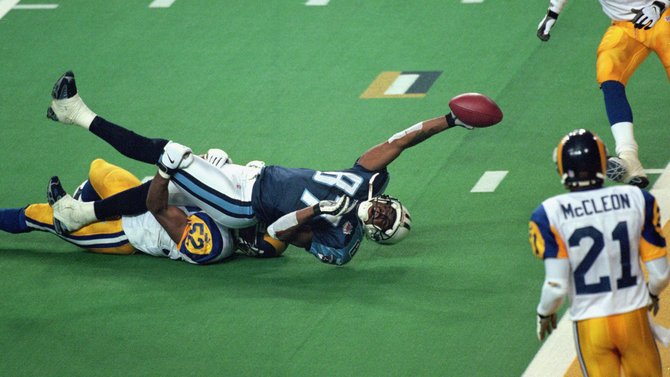

Jacksonville Jaguars
Greatest win: 1996 AFC divisional round: Jaguars 30, Broncos 27
Runner-up: 1999 AFC divisional round: Jaguars 62, Dolphins 7
The Jaguars’ three greatest wins have come in the divisional round, with the first one taking the top spot. A second-year franchise, the ’96 Jaguars crept into the playoffs before stunning the Bills in the wild-card round. A week later, the Jaguars were even bigger underdogs in Denver against the 13-3, top-seeded Broncos. The Jaguars quickly fell behind 12-0 before taking a 13-12 halftime lead. Jacksonville’s lead swelled to eight points following Mark Brunell’s 31-yard pass to Keenan McCardell at the start of the second half.
Denver rallied with a Terrell Davis touchdown run, but Jimmy Smith’s diving 16-yard touchdown catch proved to be the game-winning score. Brunell out-dueled John Elway, while Jaguars running back Natrone Means had nearly 50 more rushing yards than Davis, a future league and Super Bowl MVP.
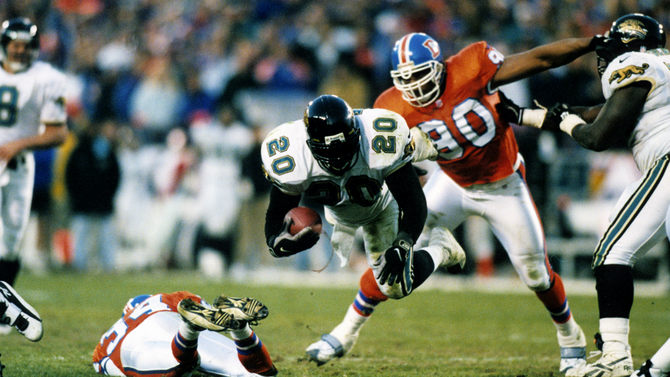

Miami Dolphins
Greatest win: Super Bowl VII: Dolphins 14, Washington 7
Runner-up: 1971 AFC divisional round: Dolphins 27, Chiefs 24 (OT)
Miami’s first-ever playoff win was one for the ages (it’s the longest game in pro football history), but the Dolphins’ first Super Bowl win a year later capped off the first — and only — perfect season in NFL history.
With 2:38 left, the Dolphins were a 42-yard field goal away from completing a 17-0 season with a 17-0 victory in the Super Bowl. Garo Yepremian’s kick, however, was blocked, denying the Dolphins a fitting final score. Things only got worse for Miami when Mike Bass scored Washington’s only touchdown of the game when he caught Yepremian’s pass attempt after recovering the ball. Miami’s defense did not allow the game to get any closer, however, as Bill Stanfill sacked Washington quarterback Billy Kilmer on the game’s final play.
The game showcased the ’72 Dolphins’ gritty yet effective winning formula. Miami’s bruising rushing attack, led by fullback Larry Csonka, rumbled for 184 yards on 37 carries. Paul Warfield, Howard Twilley and Jim Mandich each made timely catches, while Dolphins quarterback Bob Griese completed all but three of his 11 pass attempts. Defensively, Miami’s “No Name” defense shut out Washington’s offense. Manny Fernandez tallied six tackles and a sack, while safety Jake Scott’s two interceptions won him MVP honors.
Minnesota Vikings
Greatest win: 1969 NFL Championship: Vikings 27, Browns 7
Runner-up: 2017 NFC divisional round: Vikings 29, Saints 24
The Vikings’ first and only NFL title was the final one awarded before the AFL-NFL merger. Joe Kapp, a former Canadian Football League star who signed with Minnesota two years earlier, ran for a score before hitting Gene Washington for a 75-yard touchdown. Dave Osborn’s 20-yard touchdown run gave Minnesota an insurmountable 24-0 halftime lead.
The Vikings’ “Purple People Eaters” defense, led by Alan Page and Paul Krause, forced three turnovers while holding the Browns to 268 total yards.
New England Patriots
Greatest win: Super Bowl LI: Patriots 34, Falcons 28 (OT)
Runner-up: Super Bowl XXXVI: Patriots 20, Rams 17
Both these wins were historic, but most Patriots fans would point to their team’s overtime Super Bowl win as the franchise’s best victory. Trailing 28-3, New England scored 31 unanswered points that included 19 fourth-quarter points to force overtime. In the first possession of overtime, Tom Brady completed passes of 14, 18, and 15 yards to set up James White’s game-winning touchdown.
The fifth Super Bowl win in franchise history, Brady made history by winning his fourth Super Bowl MVP award. And while Brady was deserving of the MVP, Dont’a Hightower’s forced fumble of Matt Ryan midway through the fourth quarter (the Patriots trailed 28-12 at the time) changed the complexion of the game. Julian Edelman’s remarkable catch with 2:28 left enabled the Patriots to tie the game and force overtime.
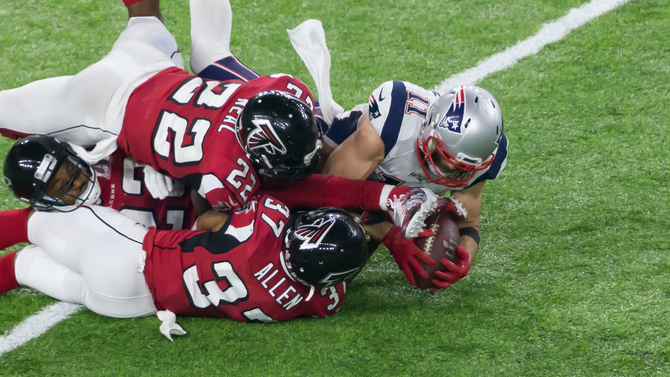

New Orleans Saints
Greatest win: Super Bowl XLIV: Saints 31, Colts 17
Runner-up: 2009 NFC Championship: Saints 31, Vikings 28 (OT)
It wasn’t quite as thrilling as their NFC title game win over Brett Favre, Adrian Peterson and the Vikings, but the Saints’ first Super Bowl win did include some drama. Trailing 10-6 at halftime, Sean Payton started the second half with the earliest onside kick attempt in Super Bowl history. The Saints recovered and took their first lead six plays later.
The Saints led 24-17 with 3:24 left when cornerback Tracy Porter’s 74-yard pick-six off Peyton Manning sealed the win for the Saints. Drew Brees was named MVP after completing 32 of 39 attempts for 288 yards and two second-half touchdown passes. Linebacker Jonathan Vilma helped the Saints hold the Colts to just 17 points by recording five tackles and deflecting a key third-down pass that led to a missed field goal at the start of the fourth quarter.
New York Giants
Greatest win: Super Bowl XLII: Giants 17, Patriots 14
Runner-up: Super Bowl XXI: Giants 39, Broncos 20
New York’s first Super Bowl win will always be cherished by Giants fans, but their team’s historic upset win over the Patriots takes top billing. The first NFC team to win the Super Bowl after winning three road playoff games, the Giants shocked the heavily-favored Patriots while denying them the chance at becoming the NFL’s first 19-0 team.
Trailing 14-10 late in the game, Eli Manning’s iconic completion to David Tyree set up Manning’s game-winning pass to Plaxico Burress with 35 seconds left. The Giants then sacked Tom Brady for a fifth time before forcing consecutive incomplete passes intended for Randy Moss. The Giants’ defensive mastery was led by Justin Tuck, who tallied two sacks, six tackles, two tackles for loss and a forced fumble. Hall of Fame pass rusher Michael Strahan recorded a sack of Brady in what was his final NFL game.
New York Jets
Greatest win: Super Bowl III: Jets 16, Colts 7
Runner-up: 1968 AFC Championship: Jets 27, Raiders 23
With respect to Rex Ryan and his team’s 2010 playoff win over the Patriots, the two biggest wins in Jets history belong to the franchise’s only championship team. Trailing late in the ’68 AFL title game, Joe Namath’s six-yard touchdown pass to Don Maynard clinched New York’s first league title.
An 18-point underdog in Super Bowl III, the Jets’ defense forced five turnovers that included three interceptions of NFL MVP Earl Morrall. Namath, who famously guaranteed victory the week of the game, played mistake-free ball while shortening his drop back to offset the Colts’ formidable pass rush. With Baltimore’s defense focused on stopping Maynard, the Jets received stellar performances from running back Matt Snell (30 carries, 121 yards, one touchdown) and receiver George Sauer (eight catches, 133 yards).
Las Vegas Raiders
Greatest win: Super Bowl XI: Raiders 32, Vikings 14
Runner-up: Super Bowl XVIII: Raiders 38, Washington 9
All three of the Raiders’ Super Bowl wins carries some significance. The Raiders became the first wild-card team to win the Super Bowl after defeating the Eagles in Super Bowl XV. Their 38-9 win over Washington three years later was the largest margin of victory in Super Bowl history. It also came after Al Davis successfully moved the team from Oakland to Los Angeles against commissioner Pete Rozelle’s wishes.
The Raiders’ first Super Bowl win, however, remains the franchise’s signature victory. After losing in seven championship games between 1967-75, John Madden’s team finally broke through in 1976. They went 13-1 in the regular season before defeating arch-rival Pittsburgh in the AFC Championship Game. In Super Bowl XI, the Raiders steamrolled the Vikings’ defense to the tune of 429 total yards and 266 yards on the ground. Fred Biletnikoff earned MVP honors after catching three passes that set up Raider touchdowns. “Old Man” Willie Brown’s 75-yard pick capped off the Raiders’ dominant victory.
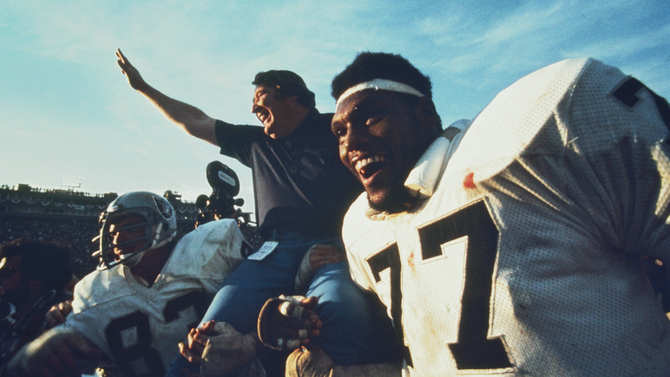

Philadelphia Eagles
Greatest win: Super Bowl LII: Eagles 41, Patriots 33
Runner-up: 1960 NFL Championship: Eagles 17, Packers 13
Led by game MVP Nick Foles, the Eagles won their first Super Bowl while depriving the Patriots’ franchise of winning back-to-back titles for a second time. Foles threw three touchdowns and was the recipient of a touchdown pass on a trick play appropriately laced the “Philly Special.”
Led by Foles’ 373 passing yards, the Eagles’ offense piled up 538 total yards against Bill Belichick’s defense. Ironically, the Patriots actually gained more yards than the Eagles, as Tom Brady threw for a Super Bowl-record 505 yards in the defeat.
San Francisco 49ers
Greatest win: 1981 NFC Championship: 49ers 28, Cowboys 27
Runner-up: Super Bowl XXIII: 49ers 20, Bengals 16
Trailing by six points, the 49ers needed to travel 89 yards in less than five minutes against Dallas’ “Doomsday” defense. Instead of looking for the big play, the 49ers relied on several sweeping runs by Lenvil Elliott, two clutch catches by Freddie Solomon and a 14-yard run by Solomon on a reverse. Facing a third down on the Cowboys’ six-yard line, Joe Montana rolled right, avoided the Cowboys’ pass rush and threw the ball to a spot in the end zone where he hoped receiver Dwight Clark would be. Clark, who was predictably in the right spot, jumped in the air and snared in Montana’s pass.
The 49ers’ defense still had to stop the Cowboys’ offense, who got the ball back at their 25-yard line with two timeouts and 51 seconds left. The crowd got tense after Danny White hit Drew Pearson for 31 yards on the Cowboys’ first play. But on the next play, White lost the ball after getting hit by Lawrence Pillers. The ball was scooped up by Jim Stuckey, who in his arms held the 49ers’ first Super Bowl ticket.
“You just beat America’s Team,” Cowboys defensive end Ed “Too Tall’ Jones told Montana, as recalled by Clark two decades later. “Well,” Montana replied, “you can sit at home with the rest of America and watch the Super Bowl.”
Seattle Seahawks
Greatest win: Super Bowl XLVIII: Seahawks 43, Broncos 8
Runner-up: 2014 NFC Championship: Seahawks 28, Packers 22 (OT)
In one of the Super Bowl’s more surprising outcomes, Seattle’s “Legion of Boom” defense overwhelmed Peyton Manning and the Broncos’ high-octane passing attack. The Seahawks’ defense actually out-scored the Broncos’ offense; they recorded a safety on the game’s first play before game MVP Malcolm Smith’s 69-yard pick-six gave Seattle a 22-0 halftime lead.
The second half started with Percy Harvin’s 87-yard kickoff return for a score. It ended with Russell Wilson’s second touchdown pass of the half, a 10-yard strike to Doug Baldwin. All told, Seattle’s defense forced four turnovers while allowing just 27 yards on the ground. They also held the Broncos to 30 fewer points than their regular-season average.
Pittsburgh Steelers
Greatest win: 1974 AFC Championship: Steelers 24, Raiders 13
Runner-up: 1972 AFC divisional round: Steelers 13, Raiders 7
Franco Harris, the owner of perhaps the greatest play in football history, said himself that Pittsburgh’s 1974 AFC Championship Game win over the Raiders was the most important game for the ’70s Steelers.
“It made us realize that we’re a really good football team,” Harris once said, “and right now we’re probably the best. And that really set the tone of what was to come for the rest of the decade.”
Two years after his “Immaculate Reception” gave the Steelers their first-ever playoff win, Harris and his teammates defeated the Raiders again to clinch their first Super Bowl berth. Trailing 10-3 at the start of the fourth quarter, the Steelers outscored the Raiders 21-3 during the game’s final stanza. Lynn Swann’s six-yard touchdown catch was sandwiched between two touchdown runs by Harris, whose 21-yard burst put the game away.
Harris and teammate Rocky Bleier combined to run for 223 of Pittsburgh’s 224 yards. Conversely, the Raiders’ formidable rushing attack was no match for the “Steel Curtain” defense, which held Oakland to just 29 yards on 21 carries. The Steelers also intercepted Ken Stabler three times, with Jack Ham coming down with two of those picks. Pittsburgh would then defeat the Vikings to win their first of four Super Bowls over a six-year span.
Tampa Bay Buccaneers
Greatest win: Super Bowl LV: Buccaneers 31, Chiefs 9
Runner-up: Super Bowl XXXVII: Buccaneers 48, Raiders 21
The historic significance of the Buccaneers’ more recent championship gives it the edge over the franchise’s first Super Bowl win. The 2020 Buccaneers became the sixth wild-card team to win the Super Bowl. They also became the fifth team to dethrone a reigning champion in the Super Bowl.
In Super Bowl LV, Tampa Bay dominated a Kansas City team that won 24 of its previous 25 games with Patrick Mahomes under center. Tampa Bay’s defense, led by linebacker Devin White (12 tackles, one interception), safety Antoine Winfield Jr. (six tackles, one interception) and defensive linemen Ndamukong Suh (1.5 sacks) and Shaquil Barrett (one sack, four quarterback hits), kept the Chiefs out of the end zone. Tampa Bay dominated on third down, as the Chiefs converted on just three of their 13 third-down situations.
Tampa Bay’s dominant defensive effort was completed by their offense. Tom Brady won a record fifth Super Bowl MVP after throwing two touchdowns to Rob Gronkowski and a third to Antonio Brown. Running backs Leonard Fournette and Ronald Jones II gained a combined 196 all-purpose yards and a touchdown on 32 touches.
Tennessee Titans
Greatest win: 1999 AFC Championship: Titans 33, Jaguars 14
Runner-up: 1999 AFC wild card: Titans 22, Bills 16
With respect to the 2019 Titans, the ’99 team’s postseason wins resulted in the franchise’s first and only Super Bowl appearance. A week after Kevin Dyson’s “Music City Miracle” gave the Titans their first postseason win, Tennessee upset Peyton Manning and the Colts in the divisional round. In the AFC Championship Game, the Titans faced a Jaguars team that was 0-2 that season against Tennessee and 15-0 against the rest of the NFL.
Trailing 14-10 at halftime, Tennessee took the lead for good on Steve McNair’s one-yard touchdown run less than six minutes into the third quarter. After the Titans’ defense recorded a safety of quarterback Mark Brunell, Derrick Mason’s 80-yard kickoff return for a score moments later gave the Titans an insurmountable 12-point lead.
McNair, who sealed the win with a one-yard scoring run with 6:59 left, combined with Eddie George to rush for 177 yards on 34 carries. Tennessee’s ball-hawking defense forced six Jaguars turnovers while holding Brunell to just 19 of 38 passing.
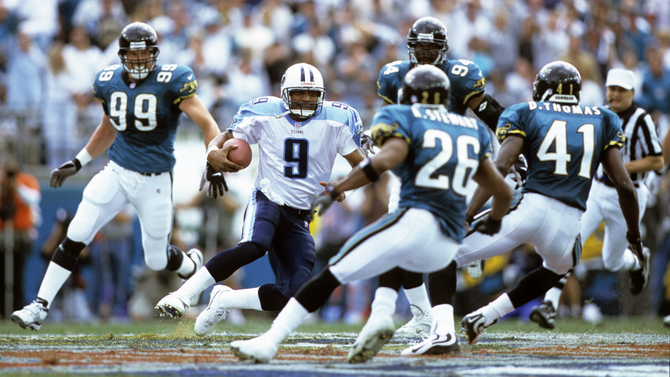

Washington Commanders
Greatest win: Super Bowl XXII: Washington 42, Broncos 10
Runner-up: Super Bowl XVII: Washington 27, Dolphins 17
Washington’s second Super Bowl win was one for the record books. Washington quarterback Doug Williams became the first Black starting quarterback to win a Super Bowl. Williams won game MVP honors after throwing for 340 yards (a Super Bowl record at the time) and four touchdowns.
Trailing 10-0 after the first quarter, Washington scored 35 points in the second quarter, an NFL playoff record. Two of Williams’ touchdown passes went to Ricky Sanders, whose 193 receiving yards are currently the second-highest total in Super Bowl history. Washington running back Timmy Smith’s 58-yard touchdown run was also part of Washington’s second-quarter scoring spree. Smith’s 204 yards remains the single-game Super Bowl rushing record.
Washington’s defense made John Elway’s second Super Bowl experience one to forget. Elway threw three interceptions — two to cornerback Barry Wilburn — and was sacked five times. He completed just 37% of his passes after starting the game with a 56-yard touchdown pass to Ricky Nattiel.
The post Greatest win for all 32 NFL teams: Cowboys’ first Super Bowl victory remains franchise’s pinnacle moment first appeared on CBS Sports.




